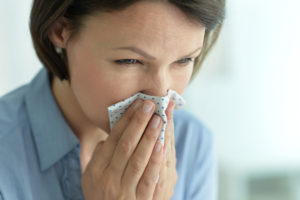Allergies
Things that Make Your Seasonal Allergies Worse
March 20, 2017
•
3 minutes
Reviewed by Michael Kaplan, MD


It happens cyclically. The itchy eyes, constant sneezing, and tight feeling in your chest, and it always happens around the same time every year. You’re one of the millions of people who get seasonal allergies. According to the American College of Allergy, Asthma, and Immunology, allergies begin in the month of February and can last until early summer. So, why do we feel awful during this season? What makes us sneeze, tear up, and cough throughout springtime?
Seasonal Allergy Triggers
During certain times of the year, there are different kinds of pollens and spores (mold) that trigger cold-like symptoms. These pollens aren’t like harmful bacteria, but your body’s response comes in the form of coughing and sneezing.
People sometimes say “spring showers bring May flowers,” but did you know that rain can make pollen counts increase? Climate is a big factor in seasonal allergies. Pollen can easily stick to grass, plants, or trees depending on the weather. Warm, high-humidity and windy climates are perfect for mold and pollen to grow and spread. If your area is experiencing heavy rain in spring or summertime, you can expect an unusually bad allergy season.
In addition, timing can affect pollen count and your allergies. The morning time is when pollen counts are higher. Turn on your local TV, read the local newspaper, or get online to get pollen counts for the day. If they are indeed high, there are preventative things you can do to ensure you don’t catch those allergies. For example, delay your outdoor activities to a later time, leave weed pulling to someone else, and remember to close your doors and windows at night to make sure that pollen doesn’t travel into your house.
Aside from your typical pollen and mold, there are other factors that can contribute toward your symptoms:
- The smell of chlorinein swimming pools can irritate your respiratory system.
- Campfire smoke smell can give your body a strong reaction toward allergens.
- Stings and bites from insects can contribute to your allergies.
- Dust mites: You might not see them, but a good way to prevent this is to keep your home free of dust, especially in pillows, sheets, and curtains.
Symptoms of Seasonal Allergies
Some seasonal allergy symptoms can include:
- Sneezing
- Watery, itchy eyes
- Itchy nose, mouth, or ears
- Congestion
- Coughing or wheezing
- Shortness of breath
- Mucus
- Tight feeling in your chest
TrustDr. Michael Kaplan and the specialists at Kaplan Sinus Relief to provide you with personalized care for your seasonal allergies. Our team will diagnose you and see which treatments work best for you. Schedule an appointment with us today and get a step closer to treating your seasonal allergies.
